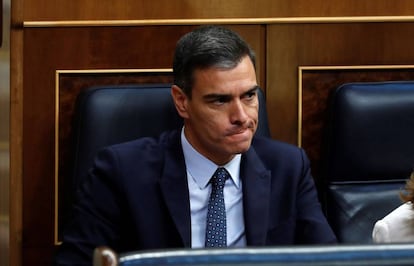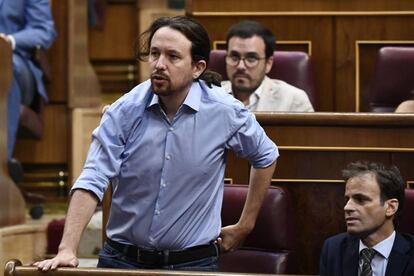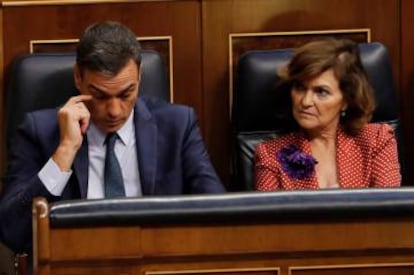At second vote in Congress, Pedro Sánchez fails to form government
The impossibility of reaching a governing deal between the Socialist Party and Unidas Podemos has today taken Spain a step closer to another general election, the fourth in as many years

Acting Spanish Prime Minister Pedro Sánchez failed to earn the trust of parliament on Thursday at a second investiture vote, meaning that he will not, for now, be able to form a new government. The candidate for the Socialist Party (PSOE) received 124 affirmative votes, 155 against and 67 abstentions.
Sánchez was backed by his own 123 lawmakers and by one representative from a small regional party in Cantabria, the PRC. The Popular Party (PP), Ciudadanos (Citizens), the far-right Vox, Junts per Catalunya, Navarra Suma and Canaries Coalition voted no. There were abstentions from Unidas Podemos, Basque Nationalist Party (PNV), Compromís, Catalan Republican Left (ERC) and Bildu.
Today is not a good day, not for anybody who considers themselves progressive
Adriana Lastra, PSOE spokesperson
Negotiations between the PSOE and left-wing Unidas Podemos continued right down to the wire today, but the two groups were unable to come up with a governing deal. The clock will now start ticking for another potential investiture vote in September, but if that also comes to nothing, Spain will head toward fresh elections in November. It would be the fourth time that Spaniards have been called to the polls to choose a government in four years, and the fifth election held this year alone.
“Today is not a good day, not for anybody who considers themselves progressive,” summed up PSOE spokesperson Adriana Lastra. “This is the second time, Mr Iglesias, that you are going to prevent a leftist government in Spain,” she added in a direct address to the leader of Unidas Podemos, Pablo Iglesias.

Unidas Podemos – a coalition of Podemos and the United Left (IU) – made a last-ditch offer to the PSOE today, demanding a deputy prime minister role for social rights and equality, as well as the Health, Labor and Science and Universities ministries. The PSOE was offering the deputy prime minister spot, as well as Health, Housing and Equality ministries.
The main sticking point, according to sources familiar with the negotiation, was the Labor Ministry, which Iglesias wanted control of. The PSOE rejected this on the basis that the left-wing party is unpopular in some economic sectors. Podemos said that they were told they could not have this ministry because of misgivings by Spain’s biggest employers association, the CEOE.
The candidate for the Socialist Party (PSOE) received 124 affirmative votes, 155 against and 67 abstentions
Speaking in Congress on Thursday ahead of the vote, Sánchez claimed that the “problem was not one of policy, but rather one of the ministries. Iglesias wanted to control the government, 100% of government spending, despite being the fourth [most-voted] party [in Congress].”
In response, during his five-minute speech, Iglesias asked Sánchez whether he believed “that you have alluded to us with the respect that a possible partner in government deserves.” He then went on to bemoan the fact that the details of the negotiations between the two parties had been leaked during the talks, before setting out what the party’s demands had been. “Today we made a proposal in which all we wanted were powers, not seats. Powers to raise the minimum wage, to stop health privatizations, for a euthanasia law once and for all, to lower university fees... We haven’t asked for anything else.”
Iglesias also made a final offer to Sánchez during his speech to Congress. “We will give up on the Labor Ministry if you give us active employment policies.” These policies cover training and career advice for the unemployed, and they are shared between the central and regional governments.
First round of voting
At the debate on Monday, Sánchez had admonished center-right parties for shunning his Socialist Party instead of the far-right Vox, which “represents the real threat to Spanish democracy.” Both the main opposition Popular Party (PP) and center-right Ciudadanos (Citizens) voted against Sánchez, ignoring pleas for an abstention.

Sánchez won the general election on April 28 with 123 seats in the 350-seat lower house. Since then he has been trying to assemble a sufficient majority to form a government, but would not agree to an outright coalition with Unidas Podemos. The acting PM said this would be tantamount to “creating two governments” within one because of significant differences over key economic and political issues. Podemos said it would not accept “decorative” positions and demanded a presence proportional to its election outcome of 42 seats.
At a first vote on Tuesday, Sánchez received 124 affirmative votes: 123 from his own lawmakers and one from the single representative for a small party from the northern region of Cantabria. This was far short of the 176 he required for an absolute majority.
The outcome fueled expectations that the PSOE and Unidas Podemos would reach a last-minute deal ahead of the second round. As late as Thursday morning, however, talks were at a standstill due to differences over what Cabinet positions should go to the anti-austerity party.
A precedent in 2016
For Sánchez, this is the second time that he has submitted to an investiture vote that failed: in March 2016, after Mariano Rajoy of the Popular Party (PP) refused to do so because of insufficient parliamentary support, the Socialist leader asked Congress to let him form a government instead. He was voted down in both rounds, with a final result of 131 affirmative votes from his own PSOE, Ciudadanos and the Canaries Coalition. There were 219 negative votes and no abstentions.
English version by Susana Urra and Simon Hunter.
Tu suscripción se está usando en otro dispositivo
¿Quieres añadir otro usuario a tu suscripción?
Si continúas leyendo en este dispositivo, no se podrá leer en el otro.
FlechaTu suscripción se está usando en otro dispositivo y solo puedes acceder a EL PAÍS desde un dispositivo a la vez.
Si quieres compartir tu cuenta, cambia tu suscripción a la modalidad Premium, así podrás añadir otro usuario. Cada uno accederá con su propia cuenta de email, lo que os permitirá personalizar vuestra experiencia en EL PAÍS.
¿Tienes una suscripción de empresa? Accede aquí para contratar más cuentas.
En el caso de no saber quién está usando tu cuenta, te recomendamos cambiar tu contraseña aquí.
Si decides continuar compartiendo tu cuenta, este mensaje se mostrará en tu dispositivo y en el de la otra persona que está usando tu cuenta de forma indefinida, afectando a tu experiencia de lectura. Puedes consultar aquí los términos y condiciones de la suscripción digital.








































